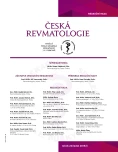-
Medical journals
- Career
Factors affecting the efficacy of anti-TNF therapy in clinical practice: experience from the ATTRA national registry
Authors: K. Pavelka 1; K. Chroust 2; P. Němec 3
Authors‘ workplace: Revmatologický ústav a Revmatologická klinika 1. lékařské fakulty Univerzity Karlovy, Praha 1; DSC Services, s. r. o., Tišnov 2; II. interní klinika, Fakultní nemocnice u sv. Anny v Brně a Lékařská fakulta Masarykovy univerzity, Brno 3
Published in: Čes. Revmatol., 22, 2014, No. 4, p. 115-123.
Category: Original Papers
Overview
Aim:
This study characterized response to the first trial of antitumor necrosis factor (TNF) drugs among rheumatoid arthritis (RA) patients in the Czech registry of biological therapy (ATTRA).Materials & methods:
The study included all patients with disease activity scores (DAS28) >5.1, and a few with scores <5.1. Monoclonal antibodies were pooled and compared to etanercept for 1 year.Results:
1945 patients were enrolled (518 etanercept, 1427 antibodies). From week 10–54, mean DAS28 was significantly lower with etanercept; and remission and low disease activity (LDA) rates were significantly higher. Etanercept was a significant predictor of remission.Conclusions:
Remission and LDA were more frequent with etanercept than with monoclonal antibodies..Key words:
Rheumatoid arthritis, biological DMARDs, anti-TNF, etanercept, monoclonal antibodies
Sources
1. Maini R, St Clair EW, Breedveld F et al. Infliximab (chimeric anti-tumour necrosis factor alpha monoclonal antibody) versus placebo in rheumatoid arthritis patients receiving concomitant methotrexate: a randomised phase III trial. ATTRACT Study Group. Lancet 1999; 54 : 1932–4.
2. van der Heijde D, Klareskog L, Rodriguez-Valverde V et al. on behalf of the TEMPO Study Investigators. Comparison of etanercept and methotrexate, alone and combined, in the treatment of rheumatoid arthritis: two-year clinical and radiographic results from the TEMPO study, a double-blind, randomized trial. Arthritis Rheum 2006; 54 : 1063–74.
3. Du Pan SM, Dehler S, Ciurea A, Ziswiler HR, Gabay C, Finckh A. on behalf of the Swiss Clinical Quality Management Physicians. Comparison of drug retention rates and causes of drug discontinuation between anti-tumour necrosis factor agents in rheumatoid arthritis. Arthritis Rheum 2009; 61 : 560–8.
4. Hetland ML, Christensen IT, Tarp U et al. on behalf of all Departments of Rheumatology in Denmark. Direct comparison of treatment responses, remission rates, and drug adherence in patients with rheumatoid arthritis treated with adalimumab, etanercept, or infliximab: results from eight years of surveillance of clinical practice in the nationwide Danish DANBIO registry. Arthritis Rheum 2010; 62 : 22–32.
5. Pavelka K, Vencovský J. Doporučení České revmatologické společnosti pro léčbu revmatoidní artritidy. Česká Revmatol 2010; 18 : 182–191.
6. Vencovský J. a výbor České revmatologické společnosti. Bezpečnost biologické léčby – Doporučení České revmatologické společnosti. Česká Revmatol 2009; 3 : 146–160.
7. Felson DT, Smolen JS, Wells G et al. On behalf of the American College of Rheumatology and the European League Against Rheumatism. American College of Rheumatology/European League Against Rheumatism provisional definition of remission in rheumatoid arthritis for clinical trials. Arthritis Rheum 2011; 63 : 573–86.
8. Smolen JS, Aletaha D, Bijlsma JW et al. on behalf of the T2T Expert Committee. Treating rheumatoid arthritis to target: recommendations of an international task force. Ann Rheum Dis 2010; 69 : 631–7.
9. Prevoo ML, van’t Hof MA, Kuper HH, van Leeuwen MA, van de Putte LB, van Riel PL. Modified disease activity scores that include twenty-eight-joint counts. Development and validation in a prospective longitudinal study of patients with rheumatoid arthritis. Arthritis Rheum 1995; 38 : 44–8.
10. Smolen JS, Breedveld FC, Schiff MH et al. A simplified disease activity index for rheumatoid arthritis for use in clinical practice. Rheumatology (Oxford) 2003; 42 : 244–57.
11. Felson DT, Smolen JS, Wells G et al. American College of Rheumatology/European League against Rheumatism provisional definition of remission in rheumatoid arthritis for clinical trials. Ann Rheum Dis 2011; 70 : 404–13.
12. Grigor C, Capell H, Stirling A et al. Effect of a treatment strategy of tight control for rheumatoid arthritis (the TICORA study): a single-blind randomised controlled trial. Lancet 2004; 364 : 263–9.
13. Goekoop-Ruiterman YP, de Vries-Bouwstra JK, Kerstens PJ et al. DAS-driven therapy versus routine care in patients with recent-onset active rheumatoid arthritis. Ann Rheum Dis 2010; 69 : 65–9.
14. Deighton C, Hyrich K, Ding T et al. on behalf of the BSR Clinical Affairs Committee & Standards, Audit and Guidelines Working Group and the BHPR. BSR and BHPR rheumatoid arthritis guidelines on eligibility criteria for the first biological therapy. Rheumatology (Oxford) 2010; 49 : 1197–9.
15. Conaghan PG, Hensor EM, Keenen AM, Morgan AW, Emery P. on behalf of the YEAR Consortium. Persistently moderate DAS-28 is not benign: loss of function occurs in early RA despite step-up DMARD therapy. Rheumatology 2010; 49 : 1894–99.
16. Dahl LL, Geborek P, Englund M et al. TNF-inhibitors in established rheumatoid arthritis: The effect of age on treatment response and predictors of response. Presented at the 2009 ACR/ARHP Annual Scientific Meeting, Philadelphia, PA, USA, October 16–21, 2009. Arthritis Rheum 2009;60 Suppl 10 : 994; DOI: 10.1002/art.26071
Labels
Dermatology & STDs Paediatric rheumatology Rheumatology
Article was published inCzech Rheumatology

2014 Issue 4
Most read in this issue- Belimumab in the treatment of systemic lupus erythematosus and other conditions
- Factors affecting the efficacy of anti-TNF therapy in clinical practice: experience from the ATTRA national registry
Login#ADS_BOTTOM_SCRIPTS#Forgotten passwordEnter the email address that you registered with. We will send you instructions on how to set a new password.
- Career

